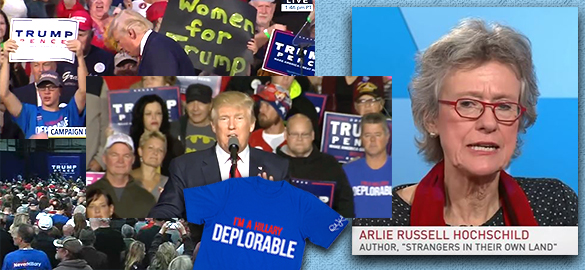RUSH: Mr. Snerdley pointed something out to me today. I would not have seen this in the normal act of show prep on my own. Washington Post. It might even be website only, I don’t even know if this ran in the newspaper. It’s the “Inspired Life” section of the Post. “What Is This Election Missing? Empathy for Trump Voters.” I said, “Whoa, what’s this? ‘Empathy for Trump Voters’? You know what empathy is. It’s not sympathy. It means we need a little bit more understanding of who these Trump people are.
So the story is about a sociologist at UC Berkeley who, what? (interruption) How many number of years? (interruption) The last five years? Is it a she or a he? (interruption) She. A sociologist at UC Berkeley immersed herself in “Middle America,” Tea Party America, for the last five years. “As the Tea Party rose to political prominence at the end of the last decade, a liberal Berkeley sociology professor set out to understand why the white working class, once a strong voting bloc for Democrats, had embraced anti-establishment ideas that put them further to the right of even the mainstream Republican Party.

They didn’t vote for Obama in either ’08 or ’12, and they’re not interested in Hillary. So this sociologist sets out to find out why. “‘What I wanted to do was take my own political and moral and social alarm system…'” (long pause) (sigh) This doesn’t make sense. It’s flower language. She means, I wanted to get rid of my biases and prejudices and go out there and actually try to objectively learn who these people are.
“‘The main thing I was trying to do was to really see if I could make friends with people, really get close'” to them. Now, stop and think of this for a second. This is like a woman… Kudos to her; don’t misunderstand here. She is a professor of sociology, which means she is teaching kids (whose parents are spending 30 grand a year to send ’em there) about sociology, and she feels totally disconnected with white, middle-class people in Middle America, and she wanted to go see if she could actually make friends with ’em.
They’re that strange to her.
They are that odd that she wanted to go see if she could make friends with them, if she could really get close. “‘For certain people…'” These are her words. “‘For certain people I asked, would you show me the school you went to, could we visit the church you went to, the cemetery where your parents were buried. They were wonderful people who I came to know in this way.'” She’s shocked. She’s shocked. She was shocked that white people voting Republican were normal. She was shocked that they were real.
Five years.

“There was a gratitude toward me, and I would tell them exactly who I was: ‘I think I live in a political bubble, and I’m trying to get out of mine and into yours. Will you talk to me?'” Stop and think about this now. This woman is brazenly open and honest about who she is. She really expected a bunch of zombies. Normal white people in Louisiana. She expected a foreign race. She expected people that she would instantly dislike, and, worse, would instantly hate her.
She could not believe how nice they were. She could not believe how open they were. She couldn’t believe how unselfish they were and un-selfcentered. This woman, I submit to you, is typical of everybody in the media today, is typical of pretty much every college professor today, is typical of pretty much every Democrat today, and certainly every social media liberal. And I don’t know where it came from, but this is classic.
She went out to find out who the Tea Party is and she thought the Tea Party was this bunch of zombie, mean-spirited, unaccepting, intolerant attackers. She thought she was gonna be attacked by showing up in their neighborhood. And she writes about how overwhelmingly shocked she was at just how opposite they were: welcoming, nice, tolerant, eager to get to know her, eager to tell her who they were. They understood who she was and what she was doing, and they wanted her to know the truth.
Then you get to page 3. She’s being interviewed by this reporter at the Washington Post. The question: “Do you think that they had preconceived notions about you, too?” She’s already shared that she thought they were zombies and intolerant, racist, sexist, bigot, homophobes. So the writer says, “Do you think they thought certain preconceived notions of you, too?”

The impressions these people have of me — well, you know what they are. We encounter it on social media all the time. So, anyway, this woman said to her (paraphrasing), “Well, we love Rush Limbaugh because he defends us. Rush Limbaugh defends us against all the attacks that we get from other liberals and the media and the Democrats. Limbaugh’s out defending us every day,” and this sociologist at Berkeley was stunned speechless. She says, “That reversed the picture [of him] to me from accuser to defender.”
She arrives in this little area in Louisiana expecting these zombies and thinking that I am their Svengali, I’m the one teaching them how to attack and how to be mean and how to be intolerant. Then she finds out they’re not at all what she thought. She finds out they love listening to me, and the reason is that I defend them against all the personal assaults that they get, and she’s had a total change of heart about me.
She no longer thinks I’m an attacker. I’m a defender. To her that changes her entire perception of me and everybody else like me. Now, what do I do here? I’ve been open and honest about what I do. I get up, I mind my own business every day, I get up and I see the things I believe in under assault. I see people I cherish under assault and I come here and I defend ’em. It’s exactly what I do. It is exactly. And I’ve made no bones about it. I defend the things, traditions, institutions, people that I value and hold dear.
Somehow that has been — I bet this woman never even listened to me. She just accepts whatever else is said about me and all the rest of us, folks, to form this opinion of I’m the kind of guy that if I walked into a room or a church, the first thing I’d do is be scouting for all the liberals, and I walk to ’em, “You pig! You get outta here. I’m Rush Limbaugh and you’re a liberal, and you don’t deserve to live. Get gone!” That’s what they think that I do when I walk into a room. It has to be.
But where does it come from? I have no idea other than the usual answers you would give to something. But it’s deep. Here’s a woman who has written a whole book about — not a whole book about how wrong she was, but about how her eyes have been opened about white middle-class people who used to be dyed-in-the-wool Democrats and aren’t anymore. And to me what’s fascinating about it is you expand this to Trump supporters and what they think of Trump and Trump supporters.
These are the people that are in the media. These the kind of people that are opinion leaders. These are the people that write columns at newspapers and online. These are the people that teach your kids. They’re closed-minded and they’re wrong about everything when it comes to who we are and values. And they’re also very afraid. That’s the thing that I really got. They’re scared to death of what they are wrong about. I found it fascinating. But it explains and illustrates what we are up against, and she admits her intolerance and how shocked she was the people she thinks that are intolerant were just the exact opposite.



